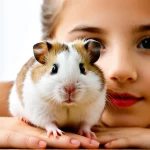Urban Challenges Faced by Pets in the UK
Living as pets in urban UK environments presents unique challenges shaped by the demands of city life. One of the main hurdles is noise pollution, which can cause stress and anxiety in animals unaccustomed to constant traffic and construction sounds. Limited space is another critical issue, with many pets confined to smaller homes or lacking access to sufficient green areas for exercise, directly affecting their physical health and overall wellbeing.
In addition, air quality concerns related to urban pollution significantly impact the respiratory health of pets. Exposure to pollutants can exacerbate conditions like asthma and allergies, common in city animals.
Also read : What are the benefits of having a pet hamster for children?
The health and behavioural impacts of these factors often manifest as increased anxiety, aggression, or withdrawal in urban pets. Behavioural problems may arise when animals cannot engage in natural activities due to restricted spaces or overstimulation from the urban environment. UK pet statistics highlight a growing population of city-dwelling animals navigating these complexities. Reports indicate that a significant portion of the UK’s pet population now resides in urban settings, underscoring the need for focused strategies to support city pet wellbeing. Addressing these challenges requires awareness and practical solutions tailored to urban lifestyles, ensuring pets thrive despite their surroundings.
Adaptations and Coping Strategies of UK Pets
City-dwelling pets in the UK often display notable behaviour changes to adjust to urban environments. Many pets become accustomed to smaller indoor spaces, relying heavily on their owners to provide enrichment and exercise. This shift leads to a rise in indoor play and mental stimulation activities, such as puzzle feeders and interactive toys.
Also read : What Makes UK Pets the Perfect Companions?
Environmental adaptation is crucial for pet adaptation in the UK. Urban pets frequently use city parks to fulfill their natural needs for exploration and socialization. These green spaces offer relief from concrete surroundings, allowing pets like dogs to experience varied sensory stimuli and maintain physical health.
Several factors influence the success of these adaptations. One key element is the owner’s awareness of their pet’s needs and proactive management of exercise and social interactions. Another is the pet’s breed and temperament; some breeds are better suited to urban living, showing greater ease in coping with noise and crowded settings.
Understanding these dynamics supports better welfare for city-dwelling pets and enhances the quality of life in urban areas, ultimately fostering strong human-animal bonds within the UK’s bustling lifestyle.
Recommended Pet Breeds for Urban Living
Discovering the perfect companions for city life
When selecting the best urban pets UK, breed choice is crucial. City-friendly breeds typically thrive in limited spaces like apartments and cope well with urban noises and bustle. For dogs, breeds such as French Bulldogs and Cavalier King Charles Spaniels stand out. These dogs exhibit calm temperaments, low exercise needs, and an affectionate nature, making them ideal for urban dog owners.
Cats naturally fit city life due to their independence and minimal space requirements. Breeds like British Shorthair and Scottish Fold are popular urban cat breeds UK, appreciated for their easygoing personalities and adaptability to indoor living.
Beyond dogs and cats, small mammals like guinea pigs and rabbits suit apartment living due to their confined space needs and quiet presence. Additionally, pet birds such as budgerigars offer companionship without demanding much room or exercise.
Understanding traits like noise tolerance, low exercise demands, and social behavior helps define city-friendly breeds well-suited for urban environments. Exploring the best urban pets UK incorporates these insights, ensuring both owner and animal enjoy a harmonious city lifestyle.
Tips for UK Urban Pet Owners
Enhancing city life for your pets
Living in a busy UK city presents unique challenges for urban pet care UK, but with thoughtful routines and enrichment for pets, your companion can thrive. Daily care routines for city pets should prioritise regular exercise despite limited outdoor spaces. Short walks in local green patches or controlled playtime on balconies, safely enclosed, help meet physical needs.
Environmental enrichment ideas for urban settings are crucial. Consider puzzle feeders or interactive toys to stimulate your pet intellectually. Rotating toys prevents boredom, which is key in confined spaces. For dogs, visits to designated dog parks or quieter streets offer safer socialisation and exercise.
UK city pet tips also include being mindful of local regulations about pet welfare, such as leash laws and noise control. Responsible ownership means providing microchipping, regular vet check-ups, and ensuring proper identification to cope with city pet risks.
Carrying essentials like water and waste bags during walks supports urban hygiene and comfort. By combining structured daily care with environmental enrichment, urban pet owners improve pets’ wellbeing and nurture happy, healthy companions despite the challenges of city living.
Legal Requirements and Guidelines for Urban Pets in the UK
Understanding the framework for responsible pet ownership
In the UK, pet laws aim to balance animal welfare with urban living challenges. Owning pets in UK cities means complying with specific regulations such as licensing and lead laws, designed to protect both animals and the public. For example, dogs must be kept on leads in designated public areas, reducing risks and ensuring safety for all residents.
Local councils enforce these rules and often offer guidance tailored to urban environments. Many councils require dog owners to register pets and follow waste disposal regulations, which help maintain city cleanliness and public health. Licensing is especially important for certain animals, ensuring owners meet welfare standards.
The RSPCA and other expert organisations provide comprehensive resources to support urban pet owners. They emphasize responsible care, regular veterinary checks, and adherence to housing rules that protect animals from urban stressors.
By understanding and following these legal requirements and guidelines, city dwellers can enjoy the companionship of pets while contributing to a community that respects animal welfare and urban living demands. This knowledge is essential for anyone considering owning pets in UK cities.
Insights from UK Veterinary and Animal Welfare Experts
Understanding expert guidance on urban pet care
UK veterinarians and urban pet welfare experts emphasize tailored strategies to meet the unique needs of city-dwelling pets. Their expert pet advice UK highlights the importance of regular exercise, mental stimulation, and safe environments within constrained spaces.
Veterinary professionals advise that urban pets often face stressors like noise pollution and limited green space. To mitigate this, vet tips for city pets recommend consistent routines and enriching indoor activities. Experts also stress routine health checks to detect environment-induced ailments early, such as respiratory issues from urban air quality.
Animal welfare bodies in the UK echo these points, providing comprehensive guidance that complements veterinary advice. They recommend exploring local resources, such as city parks designed for pets and community groups dedicated to urban animal wellbeing. These organizations offer practical support and education, reinforcing the vital role of community in successful urban pet ownership.
For pet owners seeking more in-depth guidance, numerous resources compile expert insights on urban pet welfare, ensuring access to trusted information tailored for city life. This collective knowledge empowers owners to enhance both their pets’ health and overall happiness amidst urban challenges.

